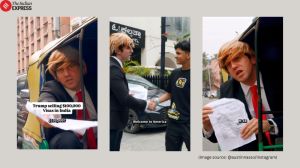This Java is Not Bitter Enough
<B>My Friend the Fanatic</B> <B><font color="cc000">Sadanand Dhume</font></B> <B>Tranquebar</B> <B>Pages: 271</B> <B>Rs 395</B>
When Sadanand Dhume first meets his friend the fanatic,the most crucial hurdle to cross is,apparently,a literary question. What,precisely,does Dhume think of V.S. Naipaul,asks Herry Nurdy. Dhume recognises that this requires careful answering. Naipaul is good on India,Dhume assures Nurdy,but that doesnt mean that he was any good on Indonesia. For Nurdy,who is 27 and edits an Islamist newspaper,this is a satisfactory answer to introduce Dhume to the world of political Islam in Indonesia,a world that Dhume otherwise would have no little trouble entering.
Dhume the expat reporter,however,thinks his answer is correct because he implied Naipaul spent too little time in Indonesia to understand it. The reader is left wondering: did Nurdy the Islamist reporter think that was the problem? Or,that Naipaul had an inherent bias,and Dhumes opinion of him was something of a litmus test of Dhumes own biases? This only begins a little game that one can play through the rest of the book: take Dhumes careful observation of little details and then check whether the place that he assigns them in his meta-narrative makes sense. That meta-narrative is about how Indonesia has changed over the years,its famously syncretic,merchant-spread Islam increasingly giving way to a sterner variant with West Asian inflections.
Dhume tries to delineate and nuance that story by writing a straightforward travelogue,in which he goes from his apartment in Puri Casablanca in Jakarta to the shrine of Yogyakarta in Java,where people come to have black magic removed,to a jail that houses Abu Bakar Bashir,accused of being the spiritual head of the organisation that conducted the Bali discotheque bombings. Nurdys newspaper named him their Man of the Year after the attacks.
Through this we are treated to Dhumes wonderful reporters eye: as at Daarut Tauhiid Super Mini Market,a representative effort at religious commerce,where womens kurtas are called the Quraesi Collection and pantyhose named Annija. The formula,Dhume points out,is simple: the profane becomes the sacred simply by giving it an Arab name and slapping on a picture of a mosque.
And,of course,the kurtas and the pantyhose section are the most likely to be renamed thus. Dhume is not an exception to the First Law of Talking About Islamisation: go on and on about what women are wearing,about midriffs,hair and shapelessness. Sometimes the border between the average travelogue about Islam and any fashion magazine becomes dangerously thin. The First Law leads us inexorably to the most startling sentence that I have read for a while: It was mesmerising as only a silver bottom rotating at high speed can be. Nurdy should be pleased. His friend the atheist has written a book that is un-Naipaul-like in being fair; un-Naipaul-like in being readable without wanting to telephone the author and hurl horrific abuse at him; and also,unfortunately,un-Naipaul-like in giving off,ever so slightly,an over-sanitised smell. For an atheist,Dhume doesnt get angry in Indonesia anywhere near often enough.
- 01
- 02
- 03
- 04
- 05






























